- Home
- C. R. Daems
Tasmanian SFG: Welcome to Hell Page 5
Tasmanian SFG: Welcome to Hell Read online
Page 5
“An excellent lesson. Never rely on a weight and height advantage. They are little help if you are facing a trained fighter,” the chief said, trying to hide a grin. He went on to explain what I had done to counter the front kick and what Avery could have done to avoid being dumped.
I had several more matches over the next two days and won them all.
“Dammit, Jolie. You make it look so easy. We know most of the techniques you do yet you slip away like a ghost,” Paul said at dinner as the week ended. Frank just nodded since his mouth was full.
“The school doesn’t teach balance. If your opponent is off balance, he can’t generate the same force or pressure and consequently it’s harder for him to execute moves or to deliver an effective kick or punch. My father wouldn’t teach me self-defense techniques until I mastered balance. It took three years.” I said and continued eating my stew, which I found tasty. When I was growing up our meals had been simple and on the bland side.
“She’s right,” Frank said. “I always get the idea I’m half drunk when I fight her. I hadn’t thought about it before, but I don’t feel stable, in balance.”
“I’d be glad to show you if you are interested.” They were and in our spare time I worked with them. I think the rest of the candidates thought them crazy as they were always bumping and pushing each other, but their self-defense showed a marked improvement.
“I see you’ve been teaching Paul and Frank…Gung Luan,” Chief Simon said one morning as we got ready for one of our supervised fighting classes.
“Balance,” I said. “You teach stable stances but when the fighting starts most focus on the offensive and defensive techniques and lose track of their balance. It makes them vulnerable.”
The chief reached into a bag he had brought with him, pulled out two knives, and tossed one to me. I caught it by the handle and realized it was rubber, colored to look like a combat knife.
“The red dye on what would be the sharp part of the knife will, with sufficient pressure, show where you cut your opponent,” the chief said loud enough for everyone to hear. “Luan and I will demonstrate,” he said as he lunged at me with a standard five-stroke technique: neck, chest, underarm, stomach, and into the heart. But I interrupted the sequence by dropping down on my right leg and sweeping at his legs with my left. He managed to dive away, roll, and come up in a crouch; however, his one leg had a red line where my knife a scored. I folded my knife back along my forearm as he approached.
“If you see your opponent fold his knife along his forearm, be careful. You have an experienced knife fighter. You can’t grab that arm without getting your hand and fingers cut, and if he blocks you with that arm the cut will be bone deep, but he has to get closer to be effective,” the chief said in teaching mode. Consistent with his advice, he remained just out of my reach and probed with a series of feints and slashes intended to create an opening. We fought for over five minutes and when he called for a stop, we each had five or six red marks on our arms, legs, and torsos. “The loser would have been the first one to succumb to the blood loss. Obviously, not the kind of fight you want…so I suggest you never have a knife fight with Luan.” He laughed. “Better to sneak up on your opponent and cut his throat. The object is to win and not to prove who is the better knife fighter.” He paused for a moment. “But if you have no choice, notice Luan scored against my legs, which I’m not used to protecting. If your opponent is crippled, he can’t chase you.”
* * *
The next day we were again flown to the jungle area. As I exited the shuttle, my heart felt like it would crack my ribs as it pounded against my chest. I fought to dissolve the fear but the image of the bamboo cage made me tremble with fear and rage. I stood frozen staring at the jungle but seeing nothing as my mind fought the urge to—run, hide, scream. Slowly my father’s training won and fear blew away, like smoke out an open window. I had hated those early lessons. He had discovered all the things that scared me, all the things I feared, and exposed me to them: vicious dogs, rats, storms, the night… He had never put me in real danger but like the Tasmanian interrogation exercise, he had made the threat seem real. Over the years I had learned to vanquish the fear and face the threat with a clear mind. Soon, my heart returned to normal, my eyes saw the forest, and I could hear the chief talking.
“The object of today’s exercise and many to follow is to kill opponents, Tasmanians, waiting in the jungle to kill you. The men standing to your right in the bright red suits are referees. Your opponents have weapons that shoot yellow paintballs. Your weapons shoot red paintballs. The referees are there to signal when you or your opponent has received a fatal wound. The object is to make it to the end of the jungle. This is a combat exercise, not an interrogation exercise,” he said, nodding in my direction. That was good, because I felt they would have had to kill me to get me in a cage again. I might have been able to conquer the fear but not the rage. I nodded back as I picked up a weapon from one of the boxes containing weapons and bags of red shells. I smiled, hoping Smitty was with this group of…opponents. I planned to turn him into a referee.
For this exercise, you are on your own,” the chief shouted. “No teaming up or helping another candidate.”
I crossed with the other thirteen candidates but stopped after only fifty meters and sat cross-legged. Several minutes later, I heard the chief’s voice.
“Tired?”
“No, Chief. I want time to get rid of the distractions and think about the Tas…my opponents’ strategy.”
“Distractions?”
“Yes, fear, apprehension, anger…” I left the rest to his imagination.
He laughed. “And revenge. War is better fought without distractions, Jolie,” he said, using my first name in a rare sign of camaraderie, then wandered off without further comment. If the Tasmanians were using night gear… I walked back to the island and rummaged through the bag of equipment we were allowed to carry—night goggles were not included. I selected a mag light and a camp light and more high-tensile string.
When I got a good hundred meters into the jungle, I went onto all fours and began a cautious bug’s pace advance while angling left. I would advance some ten to thirty meters and then remain stationary for fifteen minutes listening. Well into the afternoon, I heard several shots from paintball weapons followed by low voices. I imagined it was the referees speaking because I could make out their red coveralls. It appeared those shot had to remain where they died as I saw no one moving afterward. I was tempted to circle behind the Tasmanians and shoot them but rejected the idea, although it had a tempting appeal. The object was to cross the jungle, not kill the opponents. During those incidents I froze, reasoning that the enemy would be more alert. It was getting dark as I reached the halfway markers. Suddenly, I saw men in camouflage move back to new positions. Four settled down in a staggered line, two to three meters apart, less than ten meters ahead of me. I wasn’t going to crawl past or around them without being seen. I decided to wait. I had until mid-morning to reach the finish.
As I thought, the man closest to me put on a pair of night vision goggles as the forest descended into darkness. I concluded we were obviously not intended to complete the exercise.
While I waited for the forest to become pitch-black—there was no moon tonight—I tied a string to the camp light so that a hard tug would shut it off. Setting the light on the ground next to me, I found a small broken tree branch and settled down to wait. An hour after it had turned dark, I flung the branch about ten meters behind me, waited ten seconds and switched on the camp light, and stood. I could see seven Tasmanians and heard soft cursing as they ripped off their goggles. I began firing as I ran through the closest four, scoring one to three hits on each man and then headed toward the other three I had seen firing as I went. I yanked my string as my weapon clicked empty and the forest went dark. I ignored stealth as I ran in the direction of the finish, knowing I wouldn’t make it but having no other option. The game was rigged. I thought I was close wh
en I got hit multiple times, tripped, and fell into a shallow wet area. Two minutes later, I heard a voice.
“Candidate Luan, I pronounce you killed in action. You killed three and wounded four. You have posthumously been awarded the bronze star for meritorious service in a combat zone.” When I looked up two men in red suits stood with seven Tasmanians in paint-spattered combat fatigues. “That was sneaky,” said one of them. “I still have white spots dancing before my eyes.”
“If someone had warned me you were wearing night vision goggles, I wouldn’t have turned on the light to see where I was going,” I said. “I never thought Tasmanians would need them against lowly candidates.” That was greeted with stony stares.
* * *
The Tasmanians didn’t wear night vision goggles for the next exercise. Still, no one made it to the finish line but several got close. I think one or two of us might have but the twenty-four-hour time restriction limited our options. I focused on killing Tasmanians rather than trying to reach the finish line as I knew they were determined to make an example of us for the last time. It took me most of the twenty-four hours to pass the halfway marker, which I felt might be a minimum requirement. Then I had attached a string to several bushes and to a rock at the edge of a pool of water and moved ten meters from the closest one. I waited until one of the candidates was discovered and a shot rang out, then pulled on one of the strings. Immediately a Tasmanian rose up to shoot the bush. I then pulled on the rock, which splashed into the water, and another Tasmanian popped up and there was movement some fifteen meters to my left. I took careful aim and shot the head of the man who had risen to approach the water, then shot in the direction of the bush where a man had popped up to look toward my rigged bush, and immediately dove for the shelter of a tree as another Tasmanian jumped up and ran toward me, his weapon on full automatic. I felt pain in my thigh and when I looked I had been hit several times. When I looked I couldn’t see anyone. Then I felt a sharp pain in my back.
“You’re dead, candidate Luan,” the referee announced. A smiling Tasmanian stood about twenty meters behind me. “You killed one and wounded two.”
I found out later when we assembled for our debriefing that Frank had used my distraction to reach the finish line.
“Luan, you weren’t supposed to help other candidates,” the chief said when we had all assembled.
“I wasn’t helping anyone. I thought the Tasmanians would be especially vigilant after last time so I decided to see how many I could kill before they got me.”
The chief smiled. “Actually, I do think they might have been looking a bit harder for you than the others.” He laughed. “They expect a candidate to get the best of them now and then…but a woman. That made it a bit more embarrassing.”
* * *
For the third exercise, the candidates got night vision glasses. Ironically, no one finished but collectively we killed over half of the Tasmanians. The Tasmanians had had enough of our group and were on high alert. It was no longer a fun exercise, but a matter of pride. The week had been exhausting as we seldom got more than a few hours’ rest between exercises. The exercises took twenty-four hours, the debriefing lasted close to eight hours, the ride there and back four hours, then cleaning gear and getting ready for the next exercise another eight, leaving little time for rest before the start of the next exercise.
We were surprised the seventh morning when we assembled for what we thought would be another night in the jungle. The chief looked at us and shook his head.
“You guys and gal look like shit. Sergeant Martin, take them through their stretching exercises and then a twenty-kilometer run. That should perk them up,” he said and walked toward the mess hall. I enjoyed the run. Unlike the others, I had grown up in the mountains and my lungs were much more efficient. My father had always insisted that part of self-defense training—|Gung Luan style—was endurance. You couldn’t fight your best if you were exhausted. As a result, flexibility and endurance training were part of my everyday life.
When we returned from our run, the chief stood with Sergeant Damon smiling. “See how much better they look?” he said to his two instructors. “You have ten minutes to change into your fatigues, piss, and get back out here ready to party.”
I followed the others at a run into the barracks. I didn’t think we looked any better, nor did the chief. He knew we were running on our reserve energy. Actually, that was one of the Tasmanian school’s objectives—push the candidates to their limits to see how they performed or didn’t. When we returned, he led us to an area about a mile way where a ten-meter-diameter circle was outlined, outside of which were varying sized and shaped rocks some three meters wide.
“You’re permitted to leave the inner circle onto the rocks but not outside the circle of rocks,” the chief said, looking at each of us for a second or two. The first matches will be with stained training knives. Damon, Martin, and I will judge the match and declare a winner when we believe one of you has scored a killing or debilitating cut or series of cuts.” He picked two of the stained knives. “Paul, Kurt.” He pointed to the two men and handed each a knife and led them through the opening into the circle.
Paul won the match after each had received a couple of minor cuts to their arms with a double slash to Kurt’s stomach. The fifth match was Owen and me. He smiled as we entered the circle as his height and long arms gave him a twelve-centimeter-reach advantage. His smile widened when I folded my knife back against my forearm, giving him an even larger advantage. He began a series of standard slashes more to tease or scare me as I knew he wasn’t close enough to score against anything but my arms. After several minutes, when he had maneuvered me back near the rocks, he made his move, beginning with a slash to my face. A reasonably good move, hoping I’d step back onto the rocks and trip or lose my balance or I’d attempt to protect my face with my arms opening my chest and stomach to attack. But I had anticipated the move, so I dropped onto my right leg and swept his leading leg out from under him with my left and sliced where his femoral artery would be on the inside of his left leg.
“Stop,” Damon shouted. “Luan made a cut to the femoral artery.” He pointed to a red line on the inside of Owen’s left leg.
“She cheated!” Owen screamed.
“You can’t cheat in a war,” the chief said and snorted. “There are no referees and no rules. You live or you die. Your side wins or it loses.”
“But this isn’t war and there are referees,” Owen insisted.
“You’re right, we have referees. But we are only here to ensure you don’t try to kill your opponent or bring another weapon you aren’t allowed. However, it’s a war to see who of you will be Tasmanians and who will not.” The chief continued to pair each of us until all the candidates had a turn.
“You have thirty minutes to eat and arrive back here rested and ready to fight,” the chief said and managed not to grin. We had been bone tired when we assembled this morning and a half day of fighting hadn’t been invigorating, and a twenty-minute lunch break and a ten-minute round-trip run wasn’t likely to help.
When we finally finished it was dark, as it required well over one hundred matches since each candidate was matched with every other candidate. In the end, I won ten, lost one, and tied on three—they ruled we had either killed each other or the winner would have subsequently died before he or she could be treated. I went to bed looking forward to my first eight-hour sleep in over a week.
* * *
I leapt out of bed at the sound of the klaxon, unsure where I was or the day of the week or what was on the agenda for today. I could see it was pitch-dark so it wasn’t our normal morning wakeup for exercise.
“The chief has asked me to apologize to you for neglecting your survival skills and to conduct a timed running of the obstacle course,” Sergeant Martin said, looking amused.
“Now, Sergeant?” Slater asked while looking around the room and out the windows.
“Of course not, candidate Slater. You have te
n minutes to get to the starting line where Sergeant Damon is waiting to log you in.” He turned and left without another word.
I shrugged. One of the school’s objectives was to test each candidate’s physical and mental stamina. Sleep deprivation was a good way to test both. When I arrived, I was told I was number four and it was one thirty hours and my starting time was one forty-five. Looking around, I saw everyone, including me, was yawning and trying to focus. I began my run at one forty-five and decided to slow down. Running an obstacle course in a quarter moon was a sure way to break something that could get you disqualified. Even so, I fell six times, had to repeat two obstacles twice, and felt like I had been a stationary target at the Tasmanian firing range. I questioned my decision to take it easy when I saw my time was five minutes forty-eight seconds over my previous time but relaxed when the last man finished and my time was the fifth best. We got back to the barracks at four hundred hours.
* * *
At six we were rousted out for morning exercises and a twenty-kilometer run. And after a fifteen-minute break for breakfast, we were assembled in our standard self-defense training area.
“Luan, Owen,” the chief said without preamble. “You must disable your opponent or he or she must signal defeat. Intentionally delivering a crippling blow will lose you the match and maybe get you terminated from the school. Demonstrating you could have delivered a crippling or killing blow is acceptable.”
Owen smiled, although his eyes burned with anger and his mind probably fantasized over what he intended to do to me. He made a few feints at grabbing my arm and at delivering a front kick. Then he did a stupid thing, probably wanting sweet revenge by bringing me down using the move I used to defeat him in the knife exercise—he dropped and attempted to sweep my legs out from under me. But he was slow, and I was in balance, so when he started his leg sweep I leapt into the air avoiding the sweep and drove a flying side kick into his forehead. Unfortunately, that eliminated him from the exercise and the school. Of course, I’d never know if other factors had contributed. After Owen had been carried away by the medical staff, Chief Simon surprised me.

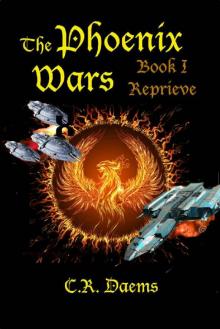 The Phoenix Wars: Book I, Reprieve
The Phoenix Wars: Book I, Reprieve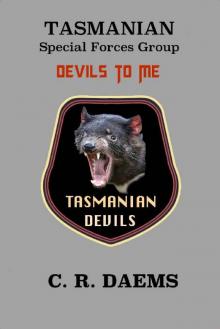 Tasmanian SFG, Book II: Devils to Me (Tasmanian series 2)
Tasmanian SFG, Book II: Devils to Me (Tasmanian series 2) The Red Admiral
The Red Admiral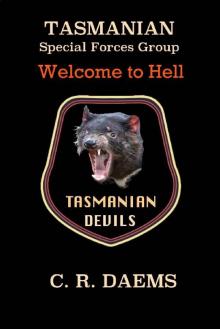 Tasmanian SFG: Welcome to Hell
Tasmanian SFG: Welcome to Hell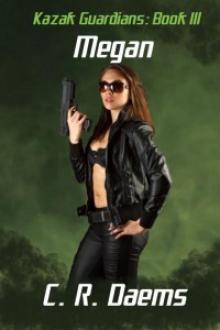 Megan
Megan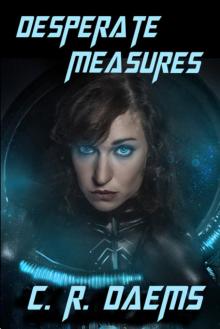 Desperate Measures: The Issog
Desperate Measures: The Issog Red Angel: Coup d'etat (Red Angel Series Book 5)
Red Angel: Coup d'etat (Red Angel Series Book 5)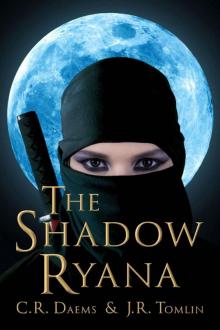 The Shadow Ryana (The Shadow Sisters Book 1)
The Shadow Ryana (The Shadow Sisters Book 1) Riss Series 5: The Riss Challenge
Riss Series 5: The Riss Challenge Red Angel: Book III: Hijackers
Red Angel: Book III: Hijackers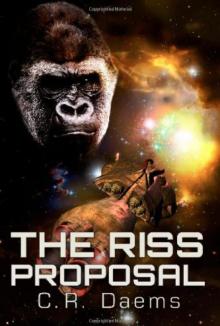 The Riss Proposal: Book II in the Riss Series (Volume 2)
The Riss Proposal: Book II in the Riss Series (Volume 2)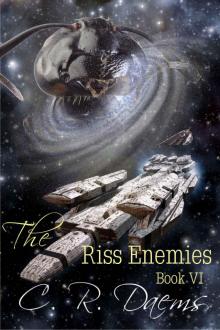 The Riss Enemies: Book VI (The Riss Series 6)
The Riss Enemies: Book VI (The Riss Series 6) Hijackers
Hijackers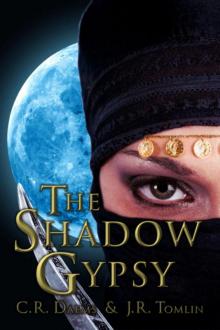 The Shadow Gypsy (The Shadow Sisters)
The Shadow Gypsy (The Shadow Sisters) The Seer Renee
The Seer Renee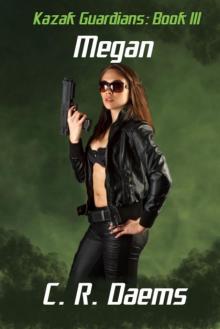 Kazak Guardians: Book III: Megan (Kazak Guardians Series 3)
Kazak Guardians: Book III: Megan (Kazak Guardians Series 3)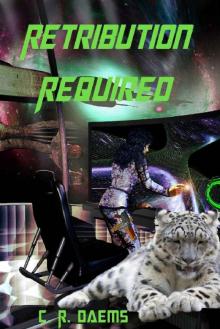 Retribution Required
Retribution Required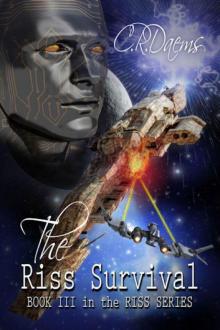 Riss Series 3: The Riss Survival
Riss Series 3: The Riss Survival The Riss Gamble
The Riss Gamble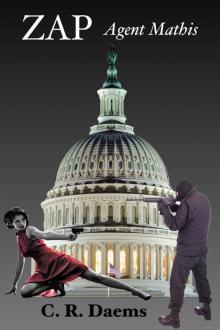 ZAP Agent Mathis
ZAP Agent Mathis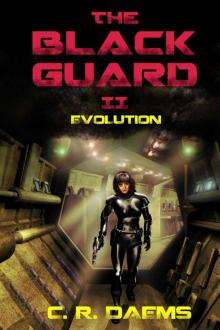 The Black Guard: Book II: Evolution (Black Guard Series 2)
The Black Guard: Book II: Evolution (Black Guard Series 2) Zara the Wolf
Zara the Wolf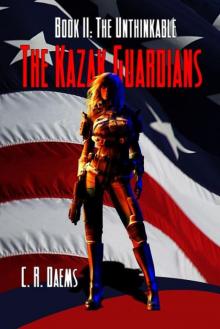 C.R. Daems - Kazak 2 - The Unthinkable
C.R. Daems - Kazak 2 - The Unthinkable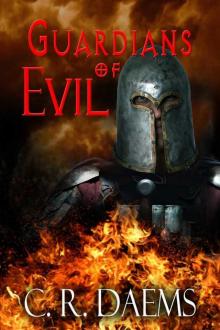 Guardians of Evil
Guardians of Evil Red Angel: Book II: Raiders (Red Angel Series 2)
Red Angel: Book II: Raiders (Red Angel Series 2)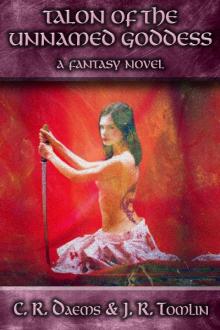 Talon of the Unnamed Goddess, a Fantasy Adventure
Talon of the Unnamed Goddess, a Fantasy Adventure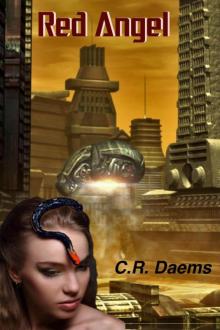 Red Angel
Red Angel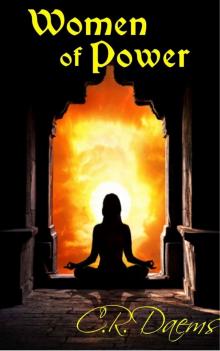 Women of Power
Women of Power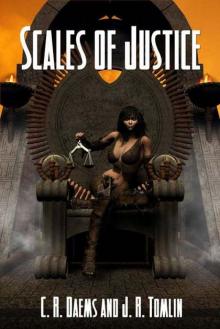 Scales Of Justice
Scales Of Justice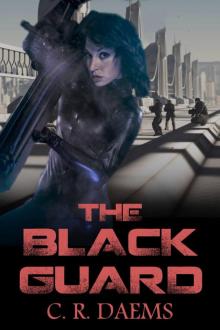 The Black Guard
The Black Guard